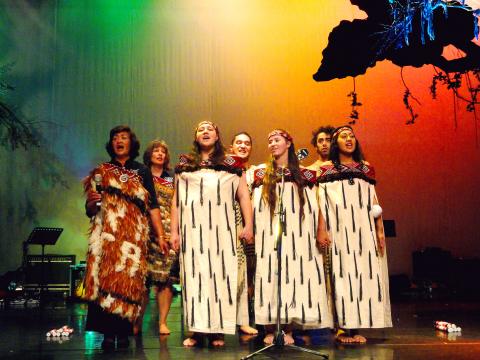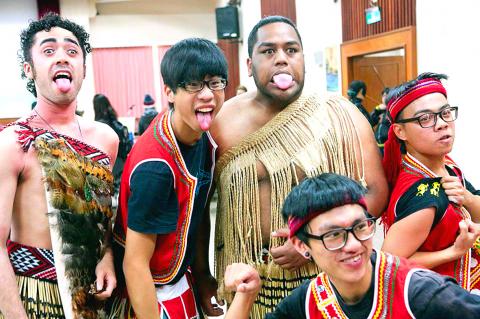Earlier this month, Maori undergraduate students from New Zealand visited Taiwan in a two-week trip organized by the Atayal Organization, a not-for-profit aiming to unite worldwide indigenous communities.
Last year, organizers had told the Taipei Times that they were fundraising to make Beyond Hawaiki, a documentary film that follows these Maori students as they meet Aborigines in Taiwan.
The Maoris completed the trip and returned to New Zealand last week, but the film project didn’t pan out as planned. Atayal Organization founder Tony Coolidge (陳華友) said the fundraising didn’t come through as expected.

Photo: Tang Hsiang-yi, Taipei Times
“The film is not in development yet; it’s been put aside,” Coolidge told the Taipei Times.
He added that all financial support they gained over the past year and a half had gone into the two-week pilot run of the Tap Root Cultural Exchange Program, which promotes mutual understanding between the Maoris and Aboriginal peoples in Taiwan.
The group had comprised Maori film students from the Auckland University of Technology (AUT), as well as Maori elders and university faculty members.

Photo courtesy of Kloie Picot
During the two weeks, they visited Aboriginal villages, museums and archaeological sites in New Taipei City, Greater Taichung, Hualien County and Taitung County. They also met Aboriginal and film students from Chaoyang University of Technology, National Dong Hwa University and Jin Shan High School.
Roots-seeking?
The Atayal Organization’s Web site (www.atayal.org) indicates that the visiting Maori group had come to Taiwan to seek their roots.
In bold lettering, the Web site introduces the exchange program with a rhetorical question: “What if the great diaspora of 400 million Austronesian peoples from 38 countries strengthened their cultural bonds by uniting at the source of their cultural roots?”
The “Opportunity” section on the Web site cites a hypothesis that suggests that the ancestors of Austronesian-speaking peoples originated from Taiwan.
But according to the Maori elders and students, the purpose of their trip had little to do with roots and reconnection.
Maori elder Makarita (Maaki) Howard said she had never heard of the theory that the Maori ancestral roots are in Taiwan.
“It has been quite an experience meeting people from Taiwan but certainly we didn’t come here to look for where we came from,” she added.
Student Urshula Ansell found the question odd when asked about roots-seeking.
“We all know who we are, where we are from; it is something Maoris hold on to,” Ansell said.
Meanwhile, Chinese-language news coverage continued to indicate that the Maoris were in Taiwan in search of their roots. A Central News Agency story dated Dec. 10 said the group came all the way across the Pacific Ocean to seek for their roots in Taiwan.
Another news story dated Dec. 4 on Yam.com reported that the group had come back to their homeland — Taiwan.
Such portrayals could have created misleading impressions about what the group had come for.
Reece Howard from AUT said he participated in the program for the opportunity to help make a film.
“I expected other people to be filming ... no one really did [that] ... there was only me filming my own project,” he said.
Asked whether he knew Beyond Hawaiki has been downsized, Howard said he was never told about that.
Ansell said each student prepared a film because they were told the trip was a “film exchange.”
“We thought we were here for one thing, but a different thing is happening.
“We all had a film to screen, but only Reece’s film was screened,” she said.
Even so, Howard and Ansell still considered the journey “an amazing experience,” citing the meet with the Taromak Rukai people as one of the most memorable parts.
One evening the Maoris and Rukai people talked to one another about their cultures by a campfire. “We called it jamming; it was great fun,” Howard said.
He added that he felt familiar with the way Rukai people socialize.
The Rukai hosts learned the Haka dance — an ancestral war dance of the Maori people — from the Internet and performed it for their guests.
“They did it really well, and we did the same in return,” Howard said.
Hurt Feelings
Indeed, the Maori group gave a performance at every stop throughout the trip, though not completely voluntarily, said Makarita (Maaki) Howard, who lectures about Maori traditions at her university.
“In New Zealand, we don’t expect our guests to entertain; whereas we have been required to entertain,” she said.
She added that being required to perform had hurt the students’ feelings.
“While Tony felt that it was a cultural exchange, we felt like performing monkeys,” she added.
For her, the best part was their first stop at Greater Taichung’s Chao Yang University of Technology, where film students of both schools engaged with each other in workshops, forums and film screenings.
“It was well-organized. It met all my expectations, because we did all the things we thought we were there to do; however it changed after that,” she said.
Taking Responsibility
In response to the group’s feedback, Coolidge said inadequate human resources and finances have led to the lack of communication, misunderstandings and unmet expectations.
“My communications with AUT were very limited with time and distance constraints. But it was a major problem I am responsible for,” Coolidge added.
He said some of his partners were well-organized and provided excellent cultural exchange opportunities, but some other partners didn’t keep their word.
“I accept responsibility for the breakdowns during the Tap Root Cultural Exchange Program,” he said.
With the signing of a new free-trade pact between Taiwan and New Zealand in July, Coolidge thinks finding funds for future programs will meet less difficulty.
The pact — titled the Agreement between New Zealand and the Separate Customs Territory of Taiwan, Penghu, Kinmen and Matsu on Economic Cooperation — includes a clause on fostering links between indigenous people of both sides.
As for Beyond Hawaiki, it will not be a full-length feature, but a brief documentary by South African expat Tobie Openshaw. The documentary will be based on interviews with the group and their performances.

Google unveiled an artificial intelligence tool Wednesday that its scientists said would help unravel the mysteries of the human genome — and could one day lead to new treatments for diseases. The deep learning model AlphaGenome was hailed by outside researchers as a “breakthrough” that would let scientists study and even simulate the roots of difficult-to-treat genetic diseases. While the first complete map of the human genome in 2003 “gave us the book of life, reading it remained a challenge,” Pushmeet Kohli, vice president of research at Google DeepMind, told journalists. “We have the text,” he said, which is a sequence of

On a harsh winter afternoon last month, 2,000 protesters marched and chanted slogans such as “CCP out” and “Korea for Koreans” in Seoul’s popular Gangnam District. Participants — mostly students — wore caps printed with the Chinese characters for “exterminate communism” (滅共) and held banners reading “Heaven will destroy the Chinese Communist Party” (天滅中共). During the march, Park Jun-young, the leader of the protest organizer “Free University,” a conservative youth movement, who was on a hunger strike, collapsed after delivering a speech in sub-zero temperatures and was later hospitalized. Several protesters shaved their heads at the end of the demonstration. A

In August of 1949 American journalist Darrell Berrigan toured occupied Formosa and on Aug. 13 published “Should We Grab Formosa?” in the Saturday Evening Post. Berrigan, cataloguing the numerous horrors of corruption and looting the occupying Republic of China (ROC) was inflicting on the locals, advocated outright annexation of Taiwan by the US. He contended the islanders would welcome that. Berrigan also observed that the islanders were planning another revolt, and wrote of their “island nationalism.” The US position on Taiwan was well known there, and islanders, he said, had told him of US official statements that Taiwan had not

We have reached the point where, on any given day, it has become shocking if nothing shocking is happening in the news. This is especially true of Taiwan, which is in the crosshairs of the Chinese Communist Party (CCP), uniquely vulnerable to events happening in the US and Japan and where domestic politics has turned toxic and self-destructive. There are big forces at play far beyond our ability to control them. Feelings of helplessness are no joke and can lead to serious health issues. It should come as no surprise that a Strategic Market Research report is predicting a Compound